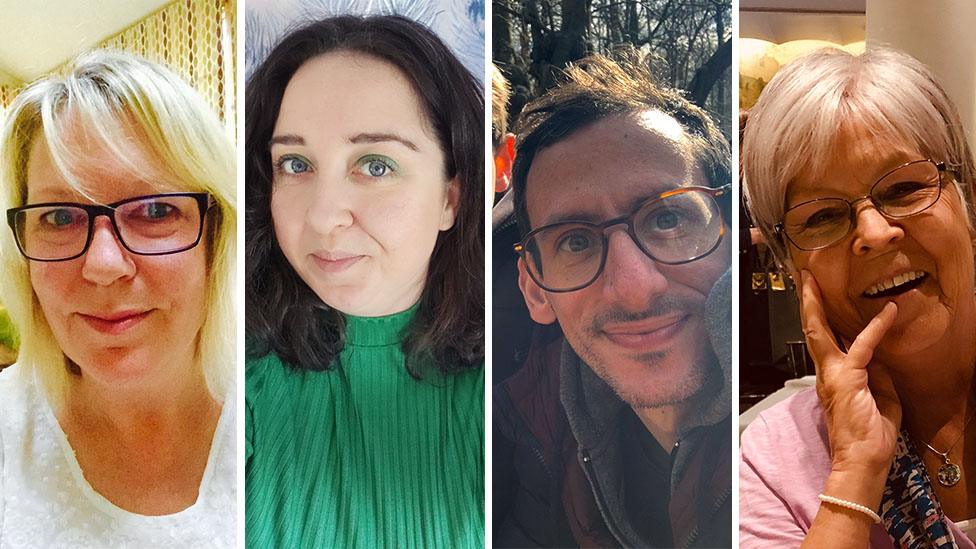Coronavirus: The people who are still shielding at home
- Published
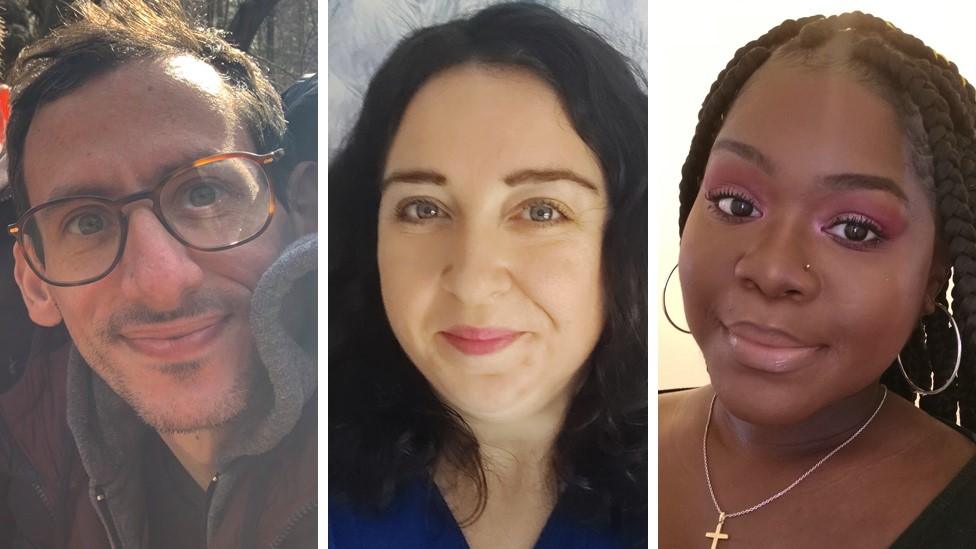
For the past three months about 2.2 million people with medical conditions that make them extremely vulnerable to coronavirus have been shielding. From next month that comes to an end for most people in the UK - depending on where you live.
At the beginning of lockdown, we spoke to some of the so-called shielded to see how they felt about avoiding all close contact for 12 weeks. Now we've gone back to ask: how do you feel about the prospect of rejoining the wider world?
'I can't live inside forever'
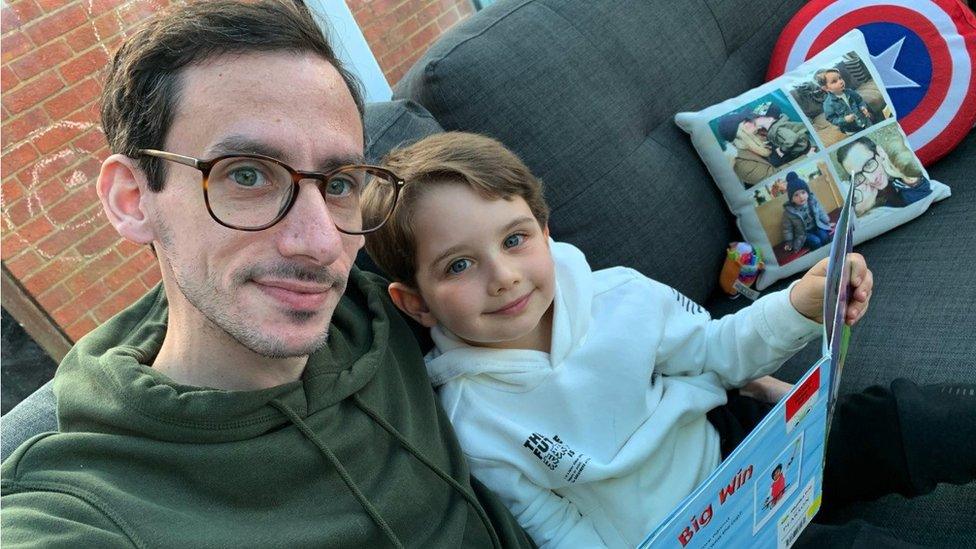
Michael Winehouse, a charity fundraiser who has cystic fibrosis, has been shielding at home with his four-year-old son and his wife.
"The novelty has certainly worn off," he says. "Just not knowing when it was due to end, knowing that everyone else is going back to normal has an impact."
The 33-year-old says shielding has "certainly worked" for people, like him, with the genetic condition cystic fibrosis, which means thick mucus clogs the lungs and makes them vulnerable to dangerous infections. Only 25 people on the UK CF Registry have caught the virus, with one death.
The prospect of an end to shielding is "fantastic", he says. From 6 July, he will be able to meet up to five others outdoors and form "support bubbles" with other households. And he will no longer need to shield from 1 August.
"It's just the opportunity to do a shop, or maybe go to a cafe for some food, or to see family and friends most importantly," he says. "I haven't seen my dad since before this started. And I see him at least once a week normally."
His son, Oscar, is in Reception at primary school. He no longer gets to see his friends on Zoom or FaceTime each day because they've gone back to class. He can't go because the whole family is having to shield.
"It's sad when he says, 'why can't I go back to school?' Or, 'I miss talking to my friends every day'. That will probably be the biggest highlight of it - just letting him go and play with his friends," Michael says.
Taking his first walk outside after three months - which happened with Oscar on Father's Day - made it clear to Michael that he was anxious about leaving the safety of their home in Epping, Essex.
"I was really apprehensive about that little first step outside, going past the end of my driveway. You don't realise how accustomed you become to your four walls," he says.
"There is always going to be a risk. I can't live inside forever, so I'm just going to have to risk assess every situation, avoid those places where bugs are likely to linger."
'I don't know how much more I could have done'
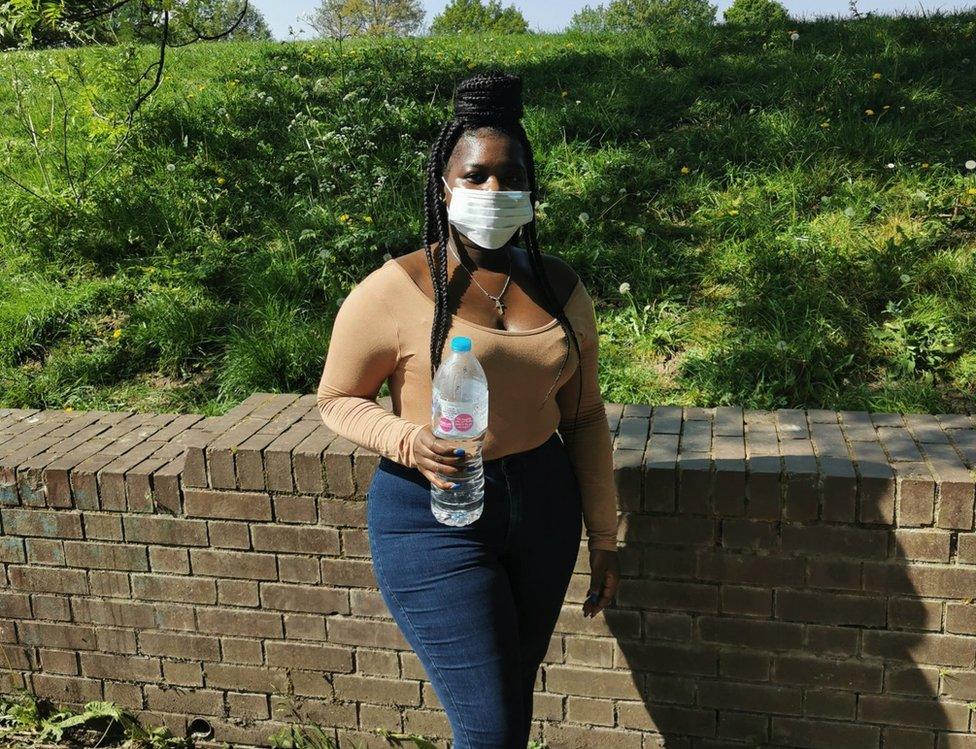
Rachel Hall, who has lupus, says she still worries about how the virus, especially how it affects people from black and Asian communities.
Rachel was among those who were hoping - or expecting - that shielding would finish on 30 June, which was the end date of the last government extension, announced earlier this month.
"I've even booked annual leave for that last week because I thought I could leave the house."
She says other announcements, including the lowering of the coronavirus alert level from level four to three, indicated things were moving in the right direction. So an extra month of shielding came as a surprise to her.
Rachel - who takes immunosuppressant medication to treat lupus, a condition where an overactive immune system attacks healthy cells in the body - says relaxing guidelines to allow people shielding to exercise outside from 1 June came just at the right time for her.
"For me anyway, I don't know how much more I could have done, just being in this house," the 31-year-old from Kent says. "You don't realise how much you just miss seeing another view, seeing somewhere else other than your own home."
"The first time I was really worried," she says of her first walk. "Especially my husband who's quite anxious. We were just being extremely careful. Even though you're happy to be out, you're still really worried. I don't think we even stayed out long." She says they haven't been out without a mask.
Reconnecting with her family is at the top of her list after missing some important family celebrations and being apart from her grandmother while she was ill with Covid-19.
"I'm really close to my family so I just want to spend more time with them somehow, even if it's just standing outside the house and having a chat," she says.
But she knows the threat from the virus will not entirely go away for her, especially as figures show black and Asian communities are disproportionately affected.
"I think I'll always be wary of it, always be taking extra precautions at least until they've got some form vaccine or something, you're just going to constantly be more cautious," she says. "Once I'm able to be around family I think I'll feel a lot better. "
'I still haven't been out'
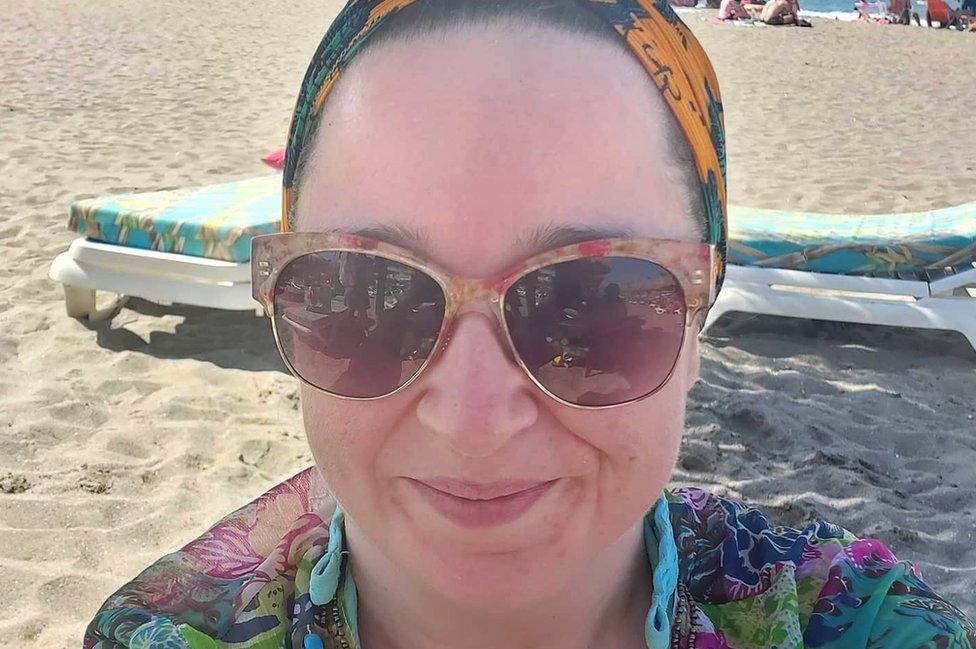
Rachael Paget, who has severe asthma, was put on a ventilator in a medically induced coma in 2017. She hasn't been out of her house since lockdown began.
Rachel has been taking a cautious approach. Three years ago she was was in a coma after a severe asthma attack. So she still hasn't left her house in Warrington, despite the relaxation of the guidelines on exercise.
"I've stayed in completely. I was thinking I might try it this week. When they said you could go out for a walk, it felt very rushed and I just wanted a bit more advice."
"It's good that it's going to be a little bit longer so we can see if any second wave happens after they've unlocked everything," says Rachael of the latest government announcement.
The 35-year-old teacher says that staying in has become "increasingly more difficult" as the months of shielding have rolled by.
She says she had to stay apart from her dad on Father's Day, even though the two are "best buds" and normally see each other almost ever day.
"People are starting to get into bubbles," she says. "I'm seeing people talk about how they spent time with their grandparents or their partner or a friend. That's quite hard when you're still stuck at home," she says.
At work too, she and some colleagues who are also shielding have had to watch as their students returned without them.
She says she misses the chatty pupils who insist on recounting every detail of their dinner, their pets, or the book they are reading. "I miss all the ridiculous things that I didn't realise I'd miss."
Rachael's says she feels "vulnerable" and is currently hearing about how people are behaving outside from friends and family. "I think I'll be a little bit more cautious just because of what I've heard," she says. "They've said a lot of people are not social distancing, barely anyone is wearing a mask, and so that worries me."
"I think the first time I step out it'll be a bit nerve-wracking. I imagine I'll feel a bit like the first time I went out with the physios post-coma," she says. "It was both exciting and nerve-wracking and shattering in equal measure."
- Published22 June 2020
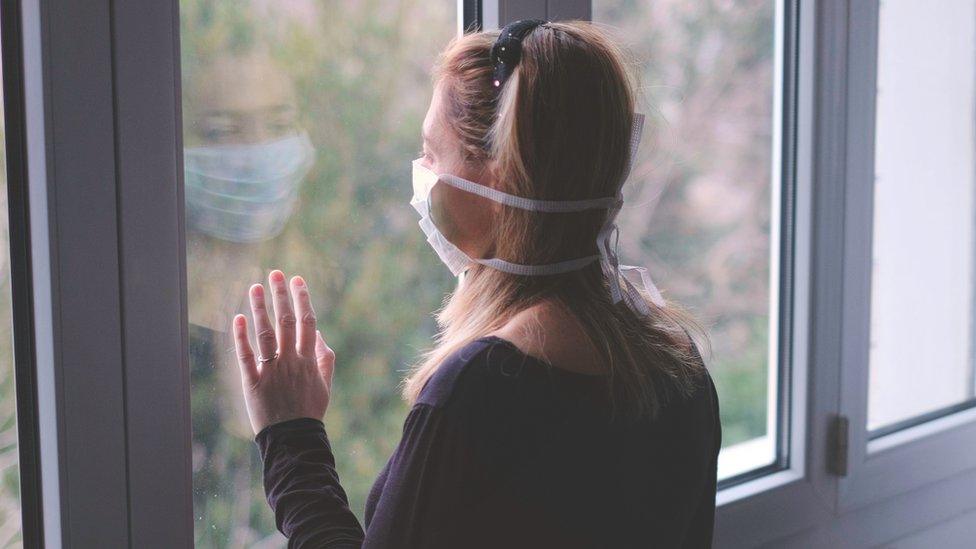
- Published13 July 2021
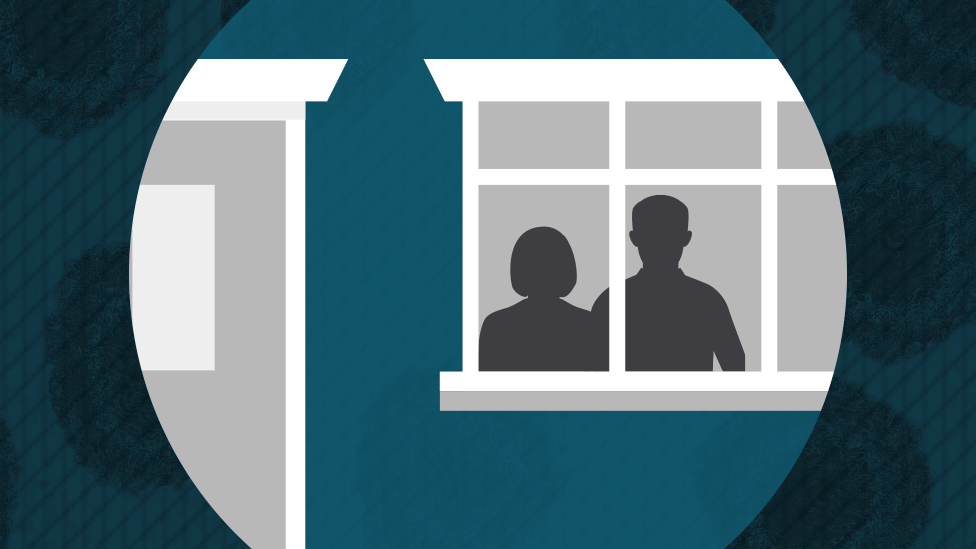
- Published15 June 2020
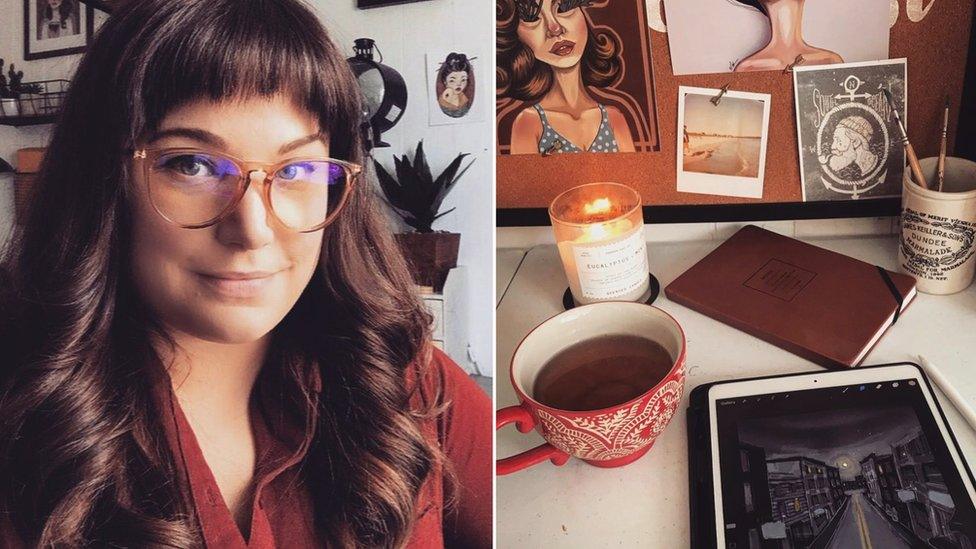
- Published29 March 2020
